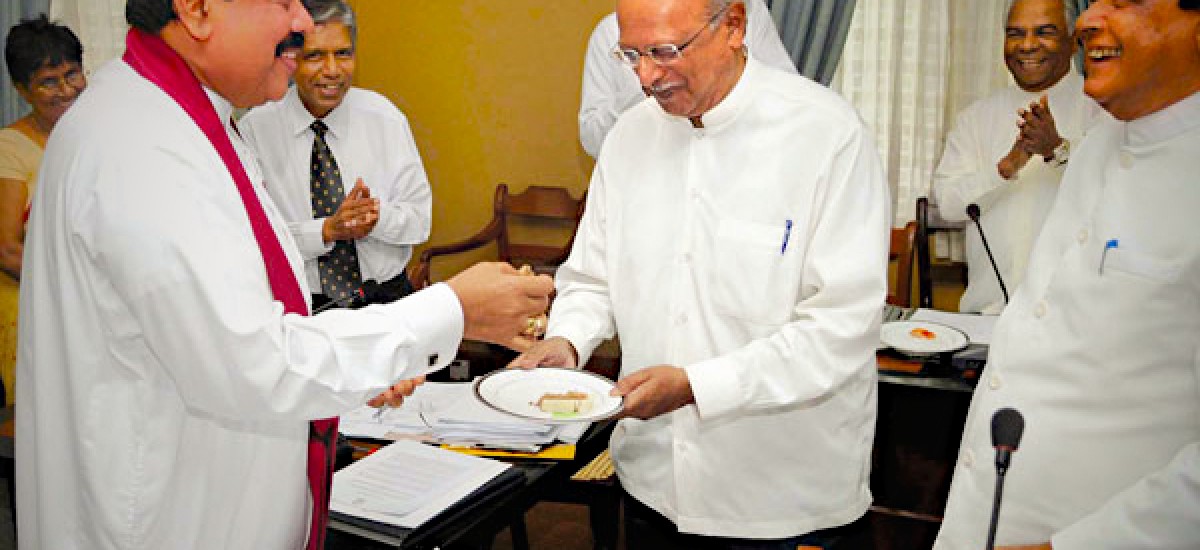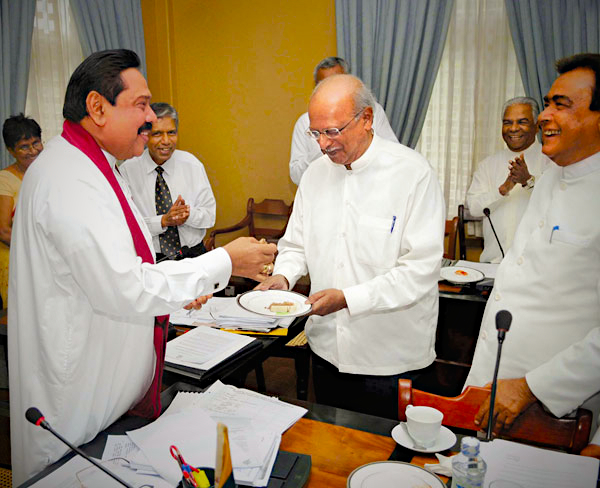Tissa Vitharana eats the President’s cake, courtesy Dinamina.
Extremist Sinhala nationalists within the parliament and outside who do not believe that the minority communities have or ever had any grievances see no reason why there should be a political settlement. As Basil Rajapaksa has pointed out if the TNA (Tamil national alliance) thinks it has a mandates for devolution of power, then the president has a bigger mandate from the South not to devolve power. The Defence Secretary, Gothabya Rajapaksa, the most important policy maker in the country today has flatly denied the need for a political settlemet. According to him since the LTTE has been exterminated there is no need for devolution; the present constitution is more than enough for all communities to live in peace. President Mahinda Rajapaksa himself doesn’t appear to be very keen on a political settlement. He played around with the APRC for almost four years and then discarded the report if produced after numerous sittings. Now it seems it’s time to hide behind a Parliamentary select committee. As a senior university lecturer Sumanasiri Liyanage points out, “what is clear is that the government is not honest and genuine in dealing with the TNA and is trying to drag the discussions without making a genuine effort to reach a consensus. What has been revealed so far shows clearly that the government is not serious about resolving the Tamil National question”. Referring to the government’s lack of commitment, Dr. Pakiasothy Saravanamuttu says the APRC and PSC are only ruses to pass the buck, buy time and appease the international community.
To arrive at a political settlement there must be consensus among the people and their leaders. To begin with there has to be reconciliation. The winners and the losers in the civil war that raged for nearly 30 years have to talk and arrive at a settlement. Since it’s the TNA that represents the Tamils (the losers) it is to them the government (the winners) has to talk. There can be no reconciliation unless the two parties make a genuine attempt to know and acknowledge the truth. Burying the past and suppressing the truth because an investigation into what actually happened would undermine the government’s development plans, will not bring about reconciliation. If those talks break down or they don’t arrive at a settlement, there is very little hope for a future peaceful Sri Lanka. Prabaharan and his cadres are dead but the growing discontent among the Tamil and Muslim youth will lead to another volcanic eruption, may be years later.
The recent post-war phenomenon, the Grease Yakas (Grease Devils) have frightened too many people, specially in the villages. Of course the villagers realize they are men in devil’s clothing. But who are these men? Villagers claim they run into police stations or army camps when chased. There are rumours to say they are fed, clothed and then released by the police. People are beginning to question whether these ‘devils’ are creations of the government, used by the forces to terrorize the people and create a feeling of unrest in the country. The Defence Secretary however, has denied using these ‘devils’ for his benefit.
And yet these ‘devils’ are spreading to different parts of the country. There is something sinister and mysterious about their origin and the areas they haunt. They were originally detected and hunted by the estate workers in the Ratnapura area. Gradually they have found their way to the North, East and the Central hills specially to areas inhabited by Tamils and Muslims. In Jaffna due to the ‘Grease Devil’ phobia 100 have been arrested, the papers report.
The hundred arrested are not ‘grease devils’ but civilians who tried to attack the ‘devils’ through fear. These ‘devils’ have obviously activated the police and the army in the North. Major General Mahinda Hathurusinghe has said, “We have increased the troops and we are now conducting mobile patrols n the area to assist the police.” Special Task Force (STF) personnel are being kept busy maintaining law and order in other areas like Puttalam, Mannar and Kinniya in the East. In all these places civilians who protest against the ‘Devils’ are the ones who are considered the villains of the peace. According to General Hathurusinghe those who disturb the peace, those who protest would be shown no mercy – in fact they would be branded “Terrorists”.
Now that the ‘Emergency Regulations’ are to be lifted the PTA (Prevention of Terrorism Act) could be more widely used to deal with these civilians who defy the ‘Grease men’. UNP parliamentarian R. Yogarajan says, “The ‘Grease Devil problem” has been created by the government to get the army into the up country. The army is now in all the estates and asking the workers to show their ID cards. We want the military to stay out because the upcountry people have never taken up arms and have always been a peaceful group”. He also raises the question why these ‘grease men’ appear in Tamil and Muslim areas only.
There is also the view that the ‘grease men’ serve the government to distract the people from the real issues such as corruption, inefficiency, Human Rights violations and the cost of living. President Mahinda Rajapaksa has also decided to set up vigilante committees headed by government MPs in all parts of the country. They too will work with the police to “eradicate the “Grease Devil”. If the LTTE Terrorists could be eradicated there is no reason why the ‘Grease Devils’ cannot be eradicated. But so far not a single Grease Devil has been caught. Even mosques are to receive “police protection”. During the last Presidential election government supporters spread the fear among the voters that if General Sarath Fonseka won the election he would establish a military state. Now, although General Fonseka is locked up in prison, people fear that gradually the whole country may be administered by the Forces.
There’s also the problem of rehabilitating those who escaped from the “Cage” during the final stages of the war. The day before the local government elections in the North in July, driving from Pudhukudiyiruppu to Killinochchi, a group of us witnessed a scene which is difficult to forget. All around us was desolation, on either side of the road we saw burnt down houses and an equal number of vehicles burnt and abandoned two years ago, shrubs and trees sprouting through the rubble, destroyed wells and an occasional lavatory standing erect amidst all this devastation. While contemplating the devastation caused by war, we were taken by surprise to see lorry loads of IDPs being brought and dumped by the roadside with all their belongings packed in a few “pora bags”. There were small children seated on these bags looking lost and forlorn. Obviously there was the need to “empty” the IDP camps before the elections, and this was one way of doing it. They were being brought back to their original “homes”. It was already late evening, how would they spend the night without lights, without shelter, surrounded by the jungle, with no human habitation in sight? Where would the children sleep? What if it rained? We found no answers to these questions. Many of these children we saw could have been those who had witnessed the deaths of many within the “Cage” before they themselves escaped. As such they would go through severe psychological trauma. According to a recent Al Jazeera report hardly anything is being done to deal with the psycho social aspect of the rehabilitation work done in the North. Papers also report that 514 children in Killinochchi have lost both their parents in the war. The National Child protection authority has selected 50 of them to receive a monthly dole of Rs. 500. What happens to the other 450 and the 3829 who have lost one parent? What will they grow up to be, with no proper education, sufficient food or shelter?
There is no doubt that the government would easily win the other 23 local government elections to be held on October 08. There is no opposition to challenge the Rajapaksa regime. Rapid development and the beautification of towns will continue to make the people happy. The South will have no reason to wish for a regime change and whether there is a political settlement or not would not worry them. But among the majority Sinhalese there is a minority that believes the Tamils and Muslims do have grievances and that it is the successive Sinhala majority governments since independence that pushed a section of the Tamil youth to take up arms against the government and finally annihilate themselves and forty thousand of their own people on that narrow stretch of land along Nandikadal lagoon, now referred to as the ‘cage’ where the final solution to the ethnic conflict was enacted in May 2009. These liberal minded people realise the need for a political settlement based on devolution of power. They also realise that if there is no settlement now, the peace we enjoy today cannot last very long. Unfortunately our political leaders on both sides, the government as well as the opposition do not realise this danger. Now that the PSC is going to take the place of the APRC, Left politicians led by Tissa Vitharana, could go on discussing “Devolution and Power sharing”, interminably perhaps for another five years, while enjoying power and perks without responsibility. It is ironic that that only Left politician who has steadfastly stood for Devolution and the rights of the minorities, Wickramabahu Karnaratne has never been voted into Parliament because he seems unable to barter his principles and convictions for power and perks as the other Left politicians have done quite shamelessly.


